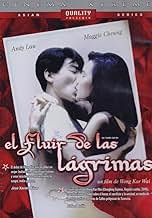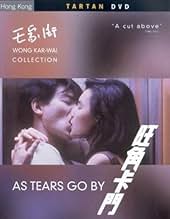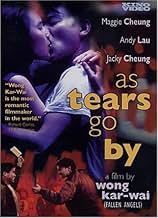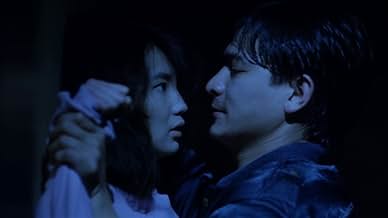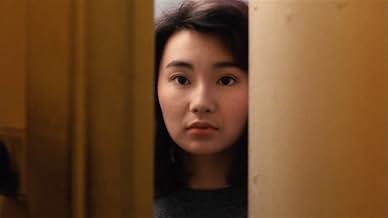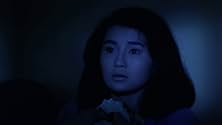IMDb-BEWERTUNG
7,0/10
13.622
IHRE BEWERTUNG
Der mittelgroße Gangster Wah verliebt sich in seine schöne Cousine, muss aber auch weiterhin seinen unberechenbaren Partner und Freund Fly beschützen.Der mittelgroße Gangster Wah verliebt sich in seine schöne Cousine, muss aber auch weiterhin seinen unberechenbaren Partner und Freund Fly beschützen.Der mittelgroße Gangster Wah verliebt sich in seine schöne Cousine, muss aber auch weiterhin seinen unberechenbaren Partner und Freund Fly beschützen.
- Auszeichnungen
- 2 Gewinne & 10 Nominierungen insgesamt
Empfohlene Bewertungen
Wong Kar-Wai's feature debut is essential viewing for anyone who's been beguiled by his more recent work, but it is really just a slightly more existential take on the standard HK gangster pic. It has more commercial considerations, less emotional complexity (or navel-gazing, if you side with Jackie Chan, who called him "the most boring film-maker on the planet")* than 'Fallen Angels' or 'In the mood for love', but there's much to admire in his idiosyncratic digressions from generic conventions. Maggie Cheung, surely one of HK's finest actresses, but so rarely allowed to prove it, is slightly wasted here. Her performance is pleasingly internal and understated, far-removed from the pseudo-comic mugging she made to enact in the Police Story movies which made her famous, but her character is really just the pining girlfriend, an iconic figure of a better future. I can fully accept Cheung as the embodiment of all that is feminine and comforting in the world, but her role is a slight disappointment given the screen-melting roles Wong handed to Brigitte Lin, Faye Wong, Karen Mok and Cheung herself in later films. And, by the way, this is very violent.
* Jackie Chan also said that Amy Yip was the ugliest woman in the world and that ladies shouldn't fight in movies.
* Jackie Chan also said that Amy Yip was the ugliest woman in the world and that ladies shouldn't fight in movies.
My feelings towards this film was mixed. In a way it seems to be overrated, just because it was Wong Kai Wei's first film and it was probably his only commercial and gangster film. It was very typical of Hong Kong gangster film in the 80s, with the same overplayed message of loyalty and the main characters trying to prove their value being the central theme. The story was plain and dull, and truthfully, it was another one of the gangster films made in the 80s that is influence by John Woo. Still, I feel this movie deserved some credit for being raved about in certain circles. First of all, this was one of the better gangster films out there, and even though the subject of loyalty seemed overplayed, it was still touching to see the friendship of a boss and his follower. Secondly, and very interestingly, the movie was filmed with an artistic touch. I have rarely seen a gangster film incorporating artistic techniques, such as the distortion of time or using shots of nature, signatures of Wong Kai Wei's latter films, but these artistic scenes became memorable. How could I ever forget the scene where Maggie was walking gingerly through the door, stopped, hesitated for a moment, but continued and slowly, but with class of a true lady, make her way up the stairs? That scene was unforgettable. Although the viewer could only see her back, but from her back, she was still able to project the feeling of uncertainty, but in the end, bravery for going after her love. Usually a scene like this would only be seen in art films, and rarely in a gangster film. In this film, however, the artistic touch only added to the movie's special appeal. A lot of Wong's artistic shots were unforgettable.
The performances by the two lead actors, Andy Lau and Jackie Cheung, were solid and touching, but far from spectacular. A lot of times I feel their expressions, especially Lau, were forced. Jackie Cheung seemed more natural in his acting, but his expressions were exaggerated, probably exaggerated to enforce his aura of cockiness, an aura that was not believable. Future films of the two stars, especially the recent ones, had better performances, and the viewer could see their vast improvements. The performance of Maggie Cheung must be complimented. Her sweet naiveness was so convincing that I had a hard time linking her with the ditsy roles she took before, such as in the Police Story. One could tell big things were ahead for her, and her future success proved it.
Overall, very interesting film, but just another one of the 80s gangster film.
7/10
The performances by the two lead actors, Andy Lau and Jackie Cheung, were solid and touching, but far from spectacular. A lot of times I feel their expressions, especially Lau, were forced. Jackie Cheung seemed more natural in his acting, but his expressions were exaggerated, probably exaggerated to enforce his aura of cockiness, an aura that was not believable. Future films of the two stars, especially the recent ones, had better performances, and the viewer could see their vast improvements. The performance of Maggie Cheung must be complimented. Her sweet naiveness was so convincing that I had a hard time linking her with the ditsy roles she took before, such as in the Police Story. One could tell big things were ahead for her, and her future success proved it.
Overall, very interesting film, but just another one of the 80s gangster film.
7/10
For me, Kar-Wai is one of the great contemporary directors. This is his first feature, and is rather a conventional Hong Kong gangster movie. However, it already has elements of the visual style and technical flourish that are utilised so well in his later more complex films. An average film with some nice touches, but certainly worth watching for Kar-Wai fans.
Andy Lau is a hood who has no time for life, just brief respites. His last girl friend had her pregnancy terminated before even telling him about it, because he hadn't called in a while. "You could have called me!" he says, but three years with him have yielded her neither money nor marriage. So he gets drunk and comes home to his bare apartment where his distant cousin, Maggie Cheung is staying while doctors run tests to see if she is going to die. Then she turns out to be ok, and goes home, while he stays and deals with the gangs of Hong Kong, particularly his inept "little brother" Jacky Cheung, and the competing gangs, and the ugly messiness that is his life.
Then he shows up at Miss Cheung's. When he has to go back to Hong Kong to deal with Jacky's messes, she says nothing, but calls his phone service and leaves a message. "Come back safely."
Kar-Wai Wong's first feature as a director can be viewed as a gloss on Melville's LE SAMOURAI, but it is not an admiring one. Lau is all professional when dealing in the underworld, but outside of it he needs to be human, wants family and love, things barred to him by his trade. Melville's romantic impulses are based on violence, the thought of the smooth, dangerous man in a beautiful and clean world populated by elegant adults, like a shark swimming through the clean ocean. Wong's world is crowded and garish ad ugly, populated by psychopaths and would-be psychopaths. Wong's sense of beauty lies in the respites, in Miss Cheung's arms, in people who care. I find it far more believable.
Then he shows up at Miss Cheung's. When he has to go back to Hong Kong to deal with Jacky's messes, she says nothing, but calls his phone service and leaves a message. "Come back safely."
Kar-Wai Wong's first feature as a director can be viewed as a gloss on Melville's LE SAMOURAI, but it is not an admiring one. Lau is all professional when dealing in the underworld, but outside of it he needs to be human, wants family and love, things barred to him by his trade. Melville's romantic impulses are based on violence, the thought of the smooth, dangerous man in a beautiful and clean world populated by elegant adults, like a shark swimming through the clean ocean. Wong's world is crowded and garish ad ugly, populated by psychopaths and would-be psychopaths. Wong's sense of beauty lies in the respites, in Miss Cheung's arms, in people who care. I find it far more believable.
No better one day film school can be found in watching "Mean Streets" and then this.
Superficially they seem the same and Kar-Wai has told us that he patterned this, his first feature after Scorsese's first.
Here's the lesson: Scorsese belongs to a school of thinking where actors create characters, real extreme and powerful characters. These characters literally create the situations around them. The filmmaker's job is to attach the camera to the characters. Nearly all Italian and Italian-American filmmakers believe this. This is fine if you can live on espresso, but most of us in a film life need something to sustain us.
Kar-Wai in his later films is clearly in another camp. He literally starts with no script. He creates a cinematic tone. Into that tone is spun a place and his actors are expected to find their way within it. Only then do we see characters, and the camera is never, ever glued to personalities.
It is a world of difference, as different as people who can talk only about other people contrasted to those who can create another world in a conversation.
Sooner or later, all lucid watchers must make a choice about how big their film universe can be. This was Kar-Wai's beginning. It is hard to see unless you know his later stuff. But it is there, like the pollen in the air.
Ted's Evaluation -- 3 of 3: Worth watching.
Superficially they seem the same and Kar-Wai has told us that he patterned this, his first feature after Scorsese's first.
Here's the lesson: Scorsese belongs to a school of thinking where actors create characters, real extreme and powerful characters. These characters literally create the situations around them. The filmmaker's job is to attach the camera to the characters. Nearly all Italian and Italian-American filmmakers believe this. This is fine if you can live on espresso, but most of us in a film life need something to sustain us.
Kar-Wai in his later films is clearly in another camp. He literally starts with no script. He creates a cinematic tone. Into that tone is spun a place and his actors are expected to find their way within it. Only then do we see characters, and the camera is never, ever glued to personalities.
It is a world of difference, as different as people who can talk only about other people contrasted to those who can create another world in a conversation.
Sooner or later, all lucid watchers must make a choice about how big their film universe can be. This was Kar-Wai's beginning. It is hard to see unless you know his later stuff. But it is there, like the pollen in the air.
Ted's Evaluation -- 3 of 3: Worth watching.
Wusstest du schon
- WissenswertesFirst film directed by Wong Kar-Wai.
- PatzerWah's facial bruises shift tremendously near the final scene from the time he got on the bus to the time he met Fly.
- Alternative VersionenSome home-video releases have different endings, which differ from the original in tone, editing, and duration. There are two of these alternate endings: one which extends the original ending by 2-1/2 minutes, the other an additional 2 minute "happy" ending. Both alternate endings are included on Criterion's Blu-ray release of the film in 2 bonus tracks, and are available for streaming on the Criterion Channel.
- VerbindungenFeatured in Fandor: Borrowing Time with Wong Kar-wai (2018)
Top-Auswahl
Melde dich zum Bewerten an und greife auf die Watchlist für personalisierte Empfehlungen zu.
Details
- Erscheinungsdatum
- Herkunftsland
- Sprache
- Auch bekannt als
- Secure Door to Cornucopia
- Produktionsfirma
- Weitere beteiligte Unternehmen bei IMDbPro anzeigen
Box Office
- Bruttoertrag in den USA und Kanada
- 9.436 $
- Eröffnungswochenende in den USA und in Kanada
- 4.279 $
- 4. Mai 2008
- Weltweiter Bruttoertrag
- 13.133 $
Zu dieser Seite beitragen
Bearbeitung vorschlagen oder fehlenden Inhalt hinzufügen


